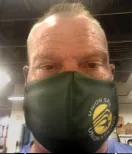New Chief Safety Officer position makes prisons safer
At the outset of the coronavirus pandemic in Illinois, AFSCME worked to implement a new role, Chief Safety Officer (CSO), to ensure open, productive communication between management and staff on the ground. It’s proving to be an invaluable asset during the ongoing public health crisis.
At each Department of Corrections facility, the local union president or their designee fills the CSO role. This frontline, union-driven approach to safety precautions has successfully shown how valuable collaborative labor relations can be.
“IDOC employees have been on the public safety front lines during this pandemic, working to ensure that Illinois correctional facilities remain safe and secure,” Council 31 Regional Director Eddie Caumiant said. “It’s an enormously challenging mission even before the coronavirus swept through our state. The union’s Chief Safety Officer is there every step of the way to ensure that the safety of all is priority number one.”
Chief Safety Officers
Steve Fanti, Local 472 President
Sheridan Correctional Center

Sheridan had the first positive COVID-19 case within IDOC—a contractual staff member tested positive and the virus spread to inmates. We were at the forefront; we were trying to get ahead of it and make sure we were handling everything properly, but still uncertain if we were doing everything right. We had pregnant staff that had been exposed, people were panicking.
The CSO position made it so that I’ve been able to go around to the buildings every day to get information out to people. The union got to be the direct liaison to the membership. During such a trying time, that brought us closer together. We overcame something big and handled it well. We’ve kept it at just 20 inmates and 15 staff infected. We’re pretty proud of what we’ve been able to do here.
The big thing was being proactive. The union rented hand-washing stations and bought extra sanitizer for sanitizing stations at the front gate. Moving around, seeing things firsthand, I get to talk to the members and they can let me know what’s going on. We have open lines of communication. The issues that occur get resolved earlier. I have a daily meeting with the warden and I can bring up concerns.
It’s a completely different atmosphere. Everyone is really conscious about what they need to do to mitigate the spread and everyone is doing their part. It makes everything safer, cleaner and makes Sheridan a better institution overall.
Lynn Fields, Local 3654 President
Southwestern Correctional Center

Working more closely with administration, we can deal with things in the moment. I don’t have to call my staff rep or shoot an email or wait for the next meeting. If something comes up, we’re right there. I walk to each assignment to check in with officers to see if they need anything or if they have questions; then I can go directly to management to get answers.
We had 15 positive cases at SWCC, all staff members who recovered and are back at work. There have been no inmate cases. Our members can go home and get well, they can be taken care of by their families. But if an inmate gets sick, it’s not going to be good. I want to make sure inmates and staff are using masks, practicing social distancing and the facility is clean. When our members are at work, they’re doing what they’re supposed to be doing. The numbers prove it. Our members are taking this seriously.
Having this new CSO role was an adjustment for everyone, but now it’s clear: This is a partnership. The union has an equal voice. Too often we think the union is just about wages, days off, benefits, discipline—but health and safety is a benefit too. It’s a key part of our contract that should be enforced and taken seriously. It’s something tangible we can see right in front of us every day. We should be really proud that we have the Chief Safety Officer role in Illinois.
Nick Jones, Local 3585 President
Illinois River Correctional Center

Being Chief Safety Officer allows me to talk to a lot of people each day, bringing information from management in a rapid fashion. And staff are able to tell me things they’re seeing firsthand and I can bring that right back to management without having to wait for a labor-management meeting or a grievance. We’ve been able to solve problems quicker. When we were setting up our quarantine and isolation areas in preparation for what may come, I was able to get ideas from military-trained employees and have them put into management’s plans.
It has definitely worked. We’ve had zero sick offenders and only seven staff with the virus—and they were all exposed outside of work. Our staff is working together very hard. They’re setting aside different personal beliefs to do what we need to do on the clock. Just knowing their union is helping make decisions and pushing back against parts they don’t like helps everyone comply with what they have to do right now. Morale is staying somewhat higher than it would have been because they know why we have to do things this way instead of just getting a memo at roll call.
I hope they keep this position. Having a safety officer to move information from top ranks to the bottom and back up has been very effective in dealing with any possible crises. During the pandemic, I have assisted with staff safety, offender safety, pandemic protocols including quarantine, morale issues, and the safety of offenders being transported. Some of our protocols have been implemented statewide. I’ve been able to work on things I wouldn’t have access to without being the CSO. It’s benefited membership across the board.
Tod Williams, Local 801 President
Kewanee Life Skills Re-Entry Center

Every day starts with a meeting to go over COVID numbers around the state and to see if anyone has any issues or suggestions. Then I walk around the facility, talking to AFSCME members. We stay on top of everything and we’ve been able to keep COVID out of the facility so that the inmates didn’t get it.
There has to be cooperation between both parties otherwise it’s not going to work. So now, instead of telling me we’re going to do something, management says, ‘This is what we’re thinking of doing. What do you think?’ With everything, we’ve heard both sides, discussed it and come to an agreement.
We just did an interview with the local newspaper, and we did it together—the warden and the union. Usually in the past we’d be talking to the media separately, but this time when the media came and asked for an interview the warden said he’s going to bring the union president into this.
This experience has been quite different than anything I’ve ever experienced after 25 years in DOC. If they can carry this COS position forward after this COVID crisis is over, the department and the state would be a lot better off. Instead of being at loggerheads all the time, now we’re getting cooperation between DOC and labor. I’ve been president for 18 years and I’ve never seen this level of cooperation. This is more give and take on both sides, more cooperation and transparency than I’ve ever seen.
Dennis Young, Local 1175 President
Menard Correctional Center

Our prison runs really smoothly. There’s a good relationship between AFSCME and the administration. As Chief Safety Officer, I walk and tour the facilities, talking to staff about the availability of PPE, its proper use and the importance of wearing it.
I’m a whistleblower for unsafe conditions. If I see something unsafe, I go to talk to the warden or administration and see how we can get it fixed. Or management might come to me, for example if someone isn’t wearing PPE properly. Then I can speak with that employee and avoid any discipline. The faster we get this virus mitigated and out of the prisons, the faster we go back to normalcy.
I think the CSO is a needed position during this crisis. It was hard to sell the administration on giving us a safety officer because staffing is such a problem, but making the safety officer be a union member, usually the president of each local, ensures that there’s total transparency from management.
We’re the largest maximum-security prison in the state. There’s still violence every day, we still have a prison to run. The inmates aren’t saying ‘time out’ during the pandemic. Having a union member in the role shows that we’re all here for the same endgame: We want the minimum number of people to get sick.
